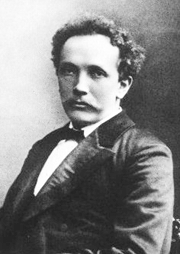On this date in 1864, composer Richard Strauss was born in Germany. Strauss began piano lessons at age 3 and composition by 7. He studied music and philosophy for two terms at Munich University and launched into a career as a conductor. His teenage composition was influenced by the work of Robert Schumann. His piano quartet of 1884 was completed following a consultation with Johannes Brahms, but the adult Strauss was influenced by Franz Liszt and Richard Wagner.
He excelled in the tone poem (including “Also Sprach Zarathustra,” setting to music Nietszche‘s and his own views), and opera. His opera “Salome” (1905), based on the play by Oscar Wilde, was a sensation not just because of the “blasphemous” subject matter but because it was a musical stretch. Another Strauss opera was “Electra” (1909). His compositions include the tone poem “Till Eulenspiegel’s Merry Pranks,” later performed as a ballet with choreography by Nijinsky. He wrote his first songs as a wedding present for his wife, Pauline von Ahna, whom he married in 1894.
Strauss composed the Olympic hymn for the 1936 games in Berlin. He was briefly appointed head of state music (without his consultation) by the Third Reich. He was barred from working with his librettist, Stefan Zweig, who was Jewish, and it is believed he maintained silence about the Nazis in part because his grandchildren were part Jewish. He received warnings about his private letters, which were screened by authorities. Strauss spent much of the war in Vienna, moving to Switzerland at the war’s conclusion. He conducted for the final time when he turned 85. D. 1949.


